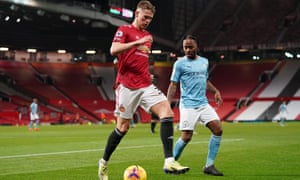“Football without fans is nothing,” read the banner draped across the Old Trafford seats on a lukewarm night in Manchester.
Not quite nothing, perhaps. But in these Covid-19 ghost games there is a tendency, now and then, for the occasion to collapse like a deflated meringue if the start is too slow, the mood too muted. Football without fans isn’t nothing. But on nights such as these it can look like 22 men running around while people in padded jackets shout at them.
So it was at Old Trafford as Manchester United and Manchester City played out a kind of anti-derby, a reverse-clásico; not just a bad 0-0, but an entirely featureless 0-0. The stats said both teams had two shots on target. It felt generous.
There will be disappointment at the lack of rage, the sense of a 90-minute act of sporting euthanasia. Goalless draws happen, as do poor games. But this was something else, a fade to grey, and that rarest of things, a game with no content.
Plus of course, proper football men don’t smile. Winners don’t do hugs. And there was a predictable snarl of rage from Roy Keane in the punditry cage as Pep Guardiola and Michael Carrick had a lovely little embrace at the final whistle, one deep-shielding pass maestro to another.
On the pitch, John Stones and Harry Maguire squeezed each other’s shoulder like fond schoolboys, then suddenly remembered themselves and had a furtive chat behind their hands, all the better to thwart the FBI lip-reading team.
It is a tribute to the basic drive of the players that more pandemic-era games haven’t ended up like this, reactive, Anschluss-type affairs. But it was fascinating, and also alarming, to see such a lack of edge in action. The story here will be City’s lack of energy, a team playing through a mild fog. There will be some praise for United’s disruption of those elegant rhythms, a point successfully gained, another draught of oxygen for the Ole era.
The really notable part, though, was the reminder of how brittle this game can be, as for 90 minutes the illusion faded, the tension slackened and disbelief was no longer suspended. What remained was two groups of players who know each other quite well, having a low-throttle game of football in a silent stadium.

Not that Ole Gunnar Solskjær felt it. Bizarrely he used his post-match debrief to describe this low-simmer game as United’s best performance in his time as manager. There will be some derision at this. But it is also a reflection of the tactical confusion of recent games, and of the easing of pressure on Solskjær’s own shoulders.
It should come as no real surprise. The greatest achievement of the Solskjær era so far has been extending the Solskjær era so far, staying in the job for a hundred games without at any stage suggesting permanence.
Here was another one of those big dates, another Ole-timatum. The Champions League exit was a dismal moment strewn with obvious managerial errors, from in-game dithering to an iffy tactical plan.
Here United’s midfield was set up to stifle. But City also lacked any real zip. At times in the first half they were a phantom version of that high-rev, high-risk machine, with its unceasing purity of intent, the obsession with pass and move. City seemed to have lost some part of their everyday selves here: the constant motion, the revolving parts, the basic sense of mischief. For much of the first half Rodri, Fernandinho and City’s centre-backs took the ball, while Kevin De Bruyne looked on politely.
Credit must go again to Solskjær’s gameplan. Scott McTominay “got close” to Raheem Sterling, leaning into the jinks and turns, looming provocatively close every time he left his man on the ground. Sterling did provide the first spark with 20 minutes gone, a zippy exchange with De Bruyne and a shot that was blocked. Otherwise he scampered fruitlessly.
So much for the poor televisual product. This was also an eerie watch, a glimpse of some future world where the physical experience has been dissipated so often, the sense of place neglected, the human connection distended, that those in-built emotional responses are lost. No rage, no bite, no madness of the crowd. The natural end point of this is laundry taking on laundry.
This is not a criticism of the players. It is extraordinary they have been able to maintain their levels for so long. The game did open up a little. City passed a bit quicker. But as the final minutes loomed the sense of entropy remained. Neither team could reach the right pitch of energy. Neither took enough of a chance. Neither deserved to win.
It was instead a night to remind us how unnaturally alive football has been in its empty arenas, how quickly this can dissipate; and how that connection must be treasured when it returns.
Source link